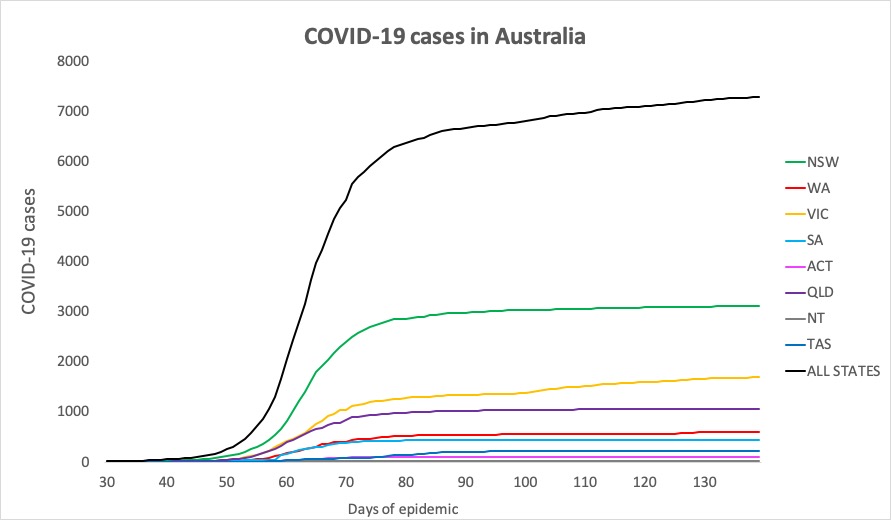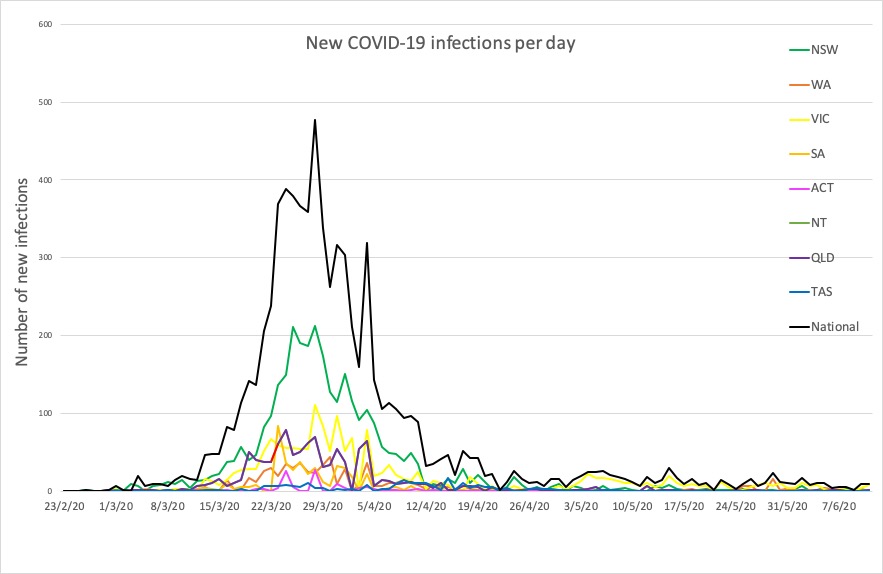COVID-19 lockdowns have brought sleep habits more in line with biological sleep patterns, but the quality of that sleep has been reduced, according to a new study
Thanks for hanging out on The Medical Republic‘s live COVID-19 blog this week.
Got any tips, comments or feedback? Email me at bianca@biancanogrady.com
The latest
- Afternoon update: COVID-19 lockdowns have us sleeping more and at the right time, but the quality has suffered.
- Morning update: refresher on COVID-19 tests, and study finds high levels of depressive symptoms and anxiety in Australians during the pandemic.
- Today’s updated COVID-19 infection figures for Australia.
- COVID-19 lockdowns have brought sleep habits more in line with biological sleep patterns, but the quality of that sleep has been reduced, according to a new study.
Writing in Current Biology, researchers presented the results of an online survey of 435 people living in Switzerland, Germany and Austria, which examined individuals’ sleep quality, their ‘social sleep restriction’ – the difference in sleep duration between work days and non-work-days – and ‘social jetlag’, which describes the mismatch between external social time and internal biological time (like when you stay up late partying and feel like crap the next day because you’ve had three hours sleep instead of your usual eight).
The study found that the COVID-19 lockdowns reduced that mismatch between social and biological schedules, and reduced the difference between the amount of sleep had on work days and the amount of sleep on non-work days. Overall, there was a median increase in sleep duration of 13 minutes; not much, but still enough to be enjoyed.
The authors said the increase in working from home, increased flexibility of working hours and a reduction in working hours contributed to people’s ‘social’ time and biological time becoming more aligned during the pandemic lockdowns.
But they found that overall sleep quality was slightly lower, which they attributed to a decrease in physical and mental wellbeing as a result of the ‘exceptional situation’ of the pandemic. - The latest TMR podcast is live! Joining TMR’s Felicity Nelson and Francine Crimmins, and COVID-19 live-blogger Bianca Nogrady as we go over the week’s pandemic stories, as well as some words of wisdom from ABC’s Dr Norman Swan and Sophie Scott, and The Guardian’s Melissa Davey speaking at TMR‘s recent health journalism masterclass.
- Need a refresher on COVID-19 tests, what they are and how they work? The TGA has put out an explainer of the two types of COVID-19 tests: nucleic acid detection tests, which look for viral RNA, and serology tests that look for antibodies to the virus. It’s a short-and-sweet overview of these two different testing approaches, and how they are currently being used in Australia.
- The prevalence of mental health problems among Australians may have doubled during the COVID-19 pandemic, according to a non-peer-reviewed preprint published in the Medical Journal of Australia.
Researchers surveyed 13,829 Australians in April using an online survey that assessed psychological symptoms over the previous fortnight. This revealed that just over one-quarter of respondents had experienced moderate to severe depressive symptoms and one in five had experienced moderate or severe anxiety – particularly individuals who had had direct experience of COVID-19.
In contrast, previous research from 2015 estimated the prevalence of clinically significant depressive symptoms to be around 3.7% in Australian adults, and research in other high-income countries has put the prevalence as being below 10%.
The survey also explored people’s optimism about the future, and found around half of respondents were optimistic but this was more likely to be among people without direct experience of COVID-19 or who had not experienced job losses or difficulties with COVID-19 restrictions.
- Victoria recorded eight new cases of COVID-19 to 9pm yesterday but they were mostly unconnected to each other. They include the close contact of a positive case associated with the Swanston Rydges hotel outbreak, a staff member at an aged care facility, a toddler at an early learning centre, an individual who attended a protest rally, and two returned travellers in hotel quarantine.
Otherwise, new infections were very low across the rest of Australia:
National – 7285, with 102 deaths and 6761 recovered
ACT – 108
NSW – 3117
NT – 29
QLD – 1063
SA – 440
TAS – 228
VIC – 1699
WA – 601




